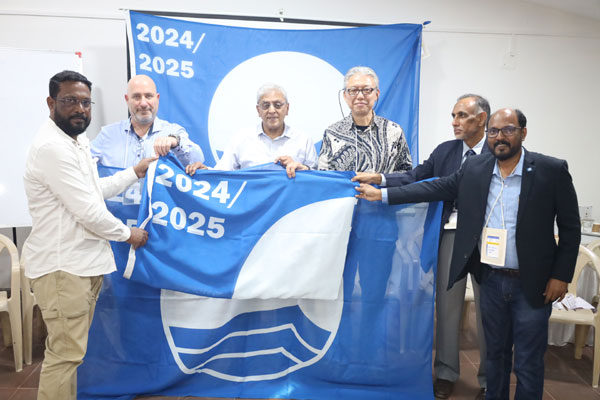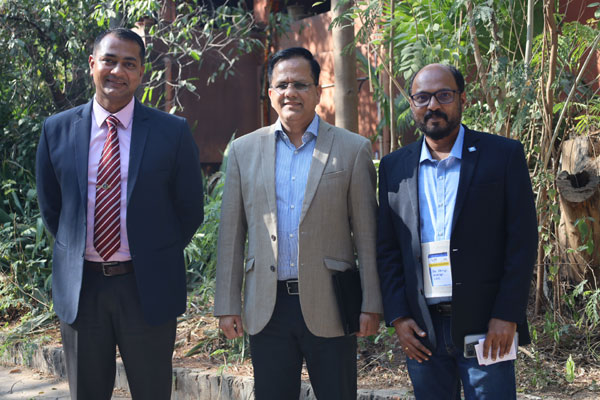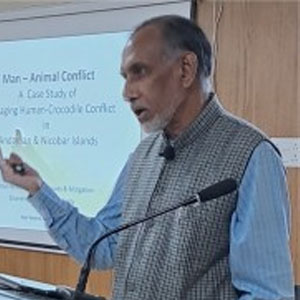Education for Sustainable Tourism and Hospitality
This session considered the context of the growing impact of tourism on the environment and
communities, ranging from ecological footprints to socio-cultural effects, demanding urgent
attention. It acknowledged that addressing this local and global concern requires advancing
sustainable tourism practices that contribute meaningfully to the Sustainable Development Goals
(SDGs). It was noted that Sustainable tourism is specifically highlighted within SDG Targets 8, 12, and
14, promoting inclusive and sustainable economic growth, sustainable consumption and production
(SCP), and the conservation of oceans and marine resources. The session also explored educational
initiatives, highlighting case practices from some of the renowned certification and eco-label
programs, such as Blue Flag, to illustrate educational approaches that have the potential to drive
sustainable transitions. It also deliberated on the need to integrate sustainability education into
tourism and hospitality curricula, fostering a skilled workforce equipped to strengthen industry
standards and empower communities and stakeholders to actively shape a sustainable tourism
future.
The workshop emphasised that education is a fundamental pillar for achieving sustainability in
tourism. Policy alignment, stakeholder engagement, and innovative approaches to certification and
responsible tourism promotion are essential.
Speakers
Mr Prasad Menon,
National Jury of Green Key India, Hyderabad
Mr. Daniel Schaffer
CEO of the Foundation for Environmental Education, Great Britain
Shri Rajendra Kumar,
I.A.S., Secretary Tourism, Government of Gujarat
Mr Masaru Takayama,
Takayama, Blue Flag & Green Key - JARTA and Founding Chair, Asian Ecotourism Network, Japan
Dr Ajai Saxena,
Ex-PCCF, Government of India, Andaman & Nicobar
Dr Shriji Kurup,
Blue Flag India, CEE
Dr Lajwanti Nadiu,
Andhra Pradesh Tourism Authority
Dr Nikhil Das,
District Tourism Promotion Council, Kozhikode
Key Recommendations from the Session
Role of Education in Driving Sustainable Tourism: Education plays a crucial role in fostering
sustainable practices and systemic changes within the tourism sector. A key focus must be
placed on pricing sustainability benefits, including conservation and responsible tourism.
Additionally, capacity building and skill development are essential to effectively address
pressing challenges such as climate change, pollution, biodiversity loss, and habitat
degradation.
- Leveraging Certifications for Sustainability: Certifications such as Blue Flag and Green Key
can be powerful tools for promoting sustainable tourism practices. However, adopting these
international certifications outside Europe requires transparency, integrity, and careful
adaptation to local contexts. Political commitment plays a vital role in mainstreaming
certification systems and leveraging them to achieve sustainability goals. Additionally,
ethical concerns—including the use of AI in certification processes—must be addressed with
a strong focus on public transparency and accountability.
- Learning from Traditional Knowledge Systems: India’s rich traditional knowledge systems
(Parampara) offer valuable insights into sustainability. Green certifications should
incorporate local, national, and cultural contexts to ensure broader stakeholder acceptance and trust. Moreover, strong political commitment is essential to strengthening sustainability
certification frameworks and maintaining their credibility.
- Responsible Tourism and Destination Management: Over tourism poses significant risks,
making promoting responsible tourism behaviour essential. Education is critical in shaping
individual and societal decisions, reinforcing sustainable tourism values. Certification
systems must balance profitability with sustainability to build trust among investors, service
providers, and tourists. Developing a skilled workforce is also key to effective destination
management and the successful implementation of sustainability practices.
- Tourism’s Impact on Ecosystems and Communities: A critical review of tourism’s impact on
ecosystems such as forests and coastal areas is needed to ensure sustainable development.
Policies must be formulated to mitigate the challenges of over-tourism and promote
responsible tourism practices. Initiatives like the Blue Flag programme create win-win
scenarios for governance and communities, fostering aspirational sustainability. It is
essential to consider the role of smaller enterprises, including homestays and eco-tourism
sites, in certification criteria. Furthermore, nurturing tourist destinations, such as Blue Flag
beaches, as place-based sustainability learning sites offers valuable environmental education
and awareness opportunities. The Blue Flag India programme has demonstrated success in
integrating sustainability education with safe tourism, effective waste management, and
marine conservation efforts.
- Transformative Potential of Education for Sustainability: Education is a vital bridge for
aligning policies, governance, and community engagement in sustainable tourism.
Certification standards must integrate regional and cultural contexts to ensure inclusivity
and relevance. Additionally, incorporating accessibility standards into destination design is
essential to enhance inclusivity and provide equitable experiences for all visitors.
- Innovation and Digital Transformation in Sustainable Tourism: Digital tools such as AI,
location-based interpretation, and audio-assisted walks can potentially enhance responsible
tourism education. The rise of digital tourism presents significant opportunities to raise mass
awareness about sustainability. Initiatives like Tourism Clubs in Kerala serve as effective
platforms to engage youth in sustainability efforts and destination management. Moreover,
investments in sustainable products, eco-friendly packaging, and support for local markets
are essential to promote environmentally responsible tourism. Finally, traditional art forms
and cultural heritage should be recognised as key benchmarks within certification systems to
preserve and celebrate cultural identity.
- Promoting Sustainability in the Hospitality Sector: Green Key and similar programmes can
effectively drive sustainable practices within the hospitality industry. Integrating traditional
knowledge—including architecture, food, and cultural heritage—into tourism experiences
enriches sustainability efforts. Educating hospitality sector employees, entrepreneurs, and
investors on environmental conservation and sustainable practices is essential. Additionally,
academic institutions and researchers play a crucial role in developing skilled professionals
and supporting the adoption of sustainability across the industry.









